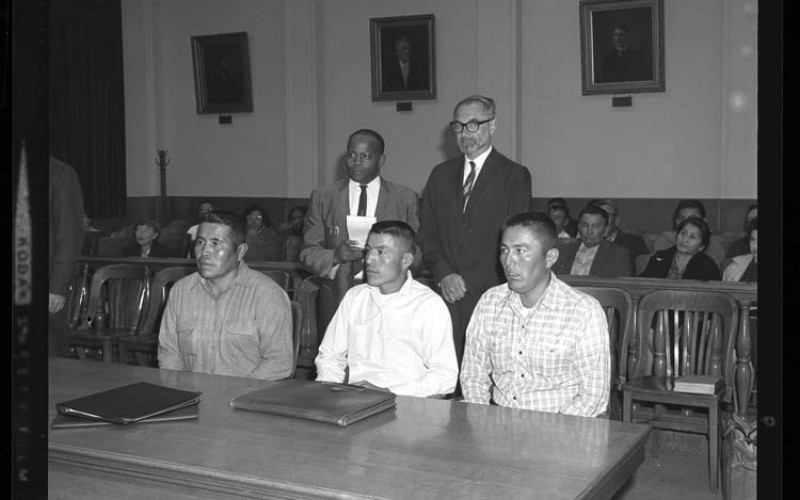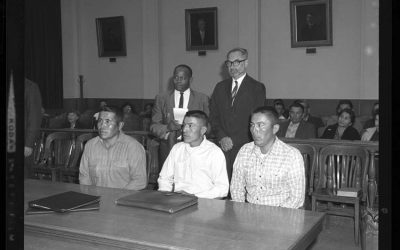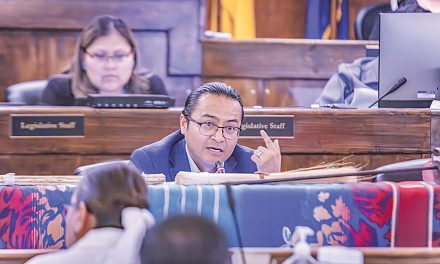
50 Years Ago: Debate over peyote in passage of bill of rights

Three Navajos face court at San Bernardino on charge of state narcotics law violation in use of peyote in 1962. They are, from left, Jack Woody, 29; Dan Dee Nez, 25; and Leon B. Anderson, 44. Behind them are lawyers, A. L. Wirin of Civil Liberties Union and Rufus Johnson. (Photo from UCLA Charles E. Young Research Library Department of Special Collections.)
Regardless of the fact that the Navajo Nation auditor general feels that there are too many tribal holidays, there are reasons why Oct. 9 should be an annual holiday on the Navajo Reservation.
It was on that date 50 years ago that the Navajo Tribal Council voted to approve a “bill of human rights.”
A wide-ranging bill, it guaranteed to all Navajos “freedom of religion, speech and press.”
Councilman Frank Luther, who moved that the resolution be approved, described it as “an instrument which will serve in a vital area.” He added that it was based on the U.S. Bill of Rights and prevents “any governmental body from interfering with the rights of individuals.”

Three Navajos face court at San Bernardino on charge of state narcotics law violation in use of peyote in 1962. They are, from left, Jack Woody, 29; Dan Dee Nez, 25; and Leon B. Anderson, 44. Behind them are lawyers, A. L. Wirin of Civil Liberties Union and Rufus Johnson. (Photo from UCLA Charles E. Young Research Library Department of Special Collections.)
There were those, however, like Freddie Howard from Tolani Lake, Arizona, who said the bill of rights wasn’t needed because these rights were also guaranteed in the Navajo Tribal Code, the Treaty of 1868 and by decisions rendered by the tribal courts.
He claimed that passage of the resolution was nothing more than a way for people who are pro-peyote to legalize its use on the reservation.
He pointed out that Navajo Tribal Chairman Raymond Nakai was a big supporter of this resolution and everyone new he had made a pledge to the Native American Church during his campaign to legalize peyote on the reservation and this is how he planned to do it.
To make his point, Howard mentioned that Nakai had been opposed to a resolution that would have legalized peyote use on the reservation, saying that these guarantees were already embodied in laws guaranteeing the freedom of religion on the reservation.
By approving the bill of rights, he said, the Council would only be strengthening his position that there was no need for a peyote resolution since it was already guaranteed in tribal law.
The writer of the article in the Navajo Times (there was no byline which indicated how controversial the article was) pointed out that the Council had approved a resolution in June of 1940 outlawing the use of peyote on the reservation and provided a nine-month jail sentence and a $100 fine for anyone found guilty of bringing peyote on the reservation.
The 1940 resolution said peyote was not connected to any “traditional religious practice” and described it as “harmful and foreign to our traditional way of life.”
The Council in 1956 restated this premise and said that any peyote that was confiscated by tribal police would be turned over to the tribe and destroyed.
But times were changing in favor of those who wanted to use peyote in religious services.
In 1965, the California Supreme Court threw out the conviction of two members of the tribe who belonged to the Native American Church and who had been found with peyote in their possession.
The California court reversed rulings by the lower courts by saying that peyote was a basic tenant of traditional Native religion and the U.S. Constitution guaranteed freedom of religion.
After a long debate, the Council approved passage of the bill of rights by a 36-11 vote.
Briefly, this is what it says:
1. The Navajo Tribal Council shall make no law establishing a religion or prohibiting the free exercise thereof, or abridging the freedom of speech or that of the press.
2. The right of the people to keep and bear arms for peaceful purposes shall not be infringed.
3. No government use shall be made of any house without the consent of the owner except in a manner to be prescribed by resolutions.
4. The right of the people to be secure in their persons, house, paper and effects against unreasonable search and seizure shall not be violated and no warrants shall be issued but upon probable cause.
5. No person shall be subject to be put in jeopardy twice for the same offense nor shall they be compelled to be a witness against themselves.
6. In all criminal proceedings, the accused shall enjoy the right to a speedy and public trial and shall be informed of the charges against them.
7. Excess bail shall not be required nor excess fines imposed, nor cruel and unusual punishment.
8. The enumeration herein of certain rights shall not be construed to deny or disparage others retained by the people.
To read the full article, pick up your copy of the Navajo Times at your nearest newsstand Thursday mornings!
Are you a digital subscriber? Read the most recent three weeks of stories by logging in to your online account.








 Highway 264,
Highway 264, I-40, WB @ Winslow
I-40, WB @ Winslow